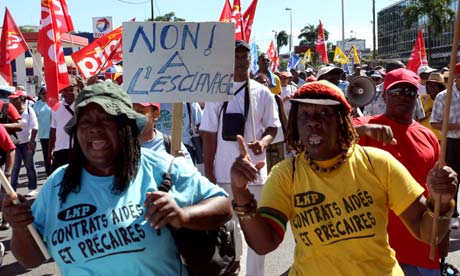Crime and unemployment dog Guadeloupe
Social crisis and lack of police resources lead to wave of delinquency among disaffected young people

Women hold a banner reading: 'Stop the slavery' during a demonstration in 2010 in Pointe-à-Pitre, on the French Caribbean island of Guadeloupe, against high living costs. Photograph: AFP
There is a growing sense of insecurity in Guadeloupe. This is not to say that crime figures have gone unnoticed in the past: Guadeloupe has France's highest crime rate. But people have started talking about an "outbreak of delinquency", "increasingly violent minors" and gangs.
Policymakers have accused the central government of negligence, Paris has blamed the local authorities, and both sides agree that the media have not helped. The facts were set out in a confidential report, commissioned by the interior ministry and its overseas counterpart, delivered in July. The report describes the "impregnation of Guadeloupean society by violence" and the "development of violent gangs". Above all it registers a "distinct deterioration" in 2009-10.
On an island with a population of 400,000, news travels fast and everyone has noticed the wave of petty crime. It is a direct threat to the tourist trade. After 6pm, the old town centre of Pointe-à-Pitre, a port of call for Caribbean cruises, is taken over by drug-dealing and prostitution.
The Socialist (PS) leader of the regional council, Victorin Lurel, made violence and insecurity the central theme of a congress last month. Some claimed this was a political ploy; he belongs to PS candidateFrançois Hollande's campaign staff for the coming French presidential election.
Over several weeks a team formed by Lurel interviewed policymakers, magistrates, police, social workers and sociologists. All this groundwork was reduced to single phrase that a contributing criminologist let slip: "It is striking to observe that the majority of crimes and offences are committed by Guadeloupeans of African descent." This caused an outcry. "An unfortunate statement," admits Gladys Démocrite, who co-ordinated the survey. "What she meant was that outstanding identity issues may generate violence."
So ultimately leftwing councillors and separatist groups can agree on at least one point: Guadeloupean identity, the legacy of slavery and the social crisis are the three main factors driving delinquency and violence.
Eric Jalton, an independent leftwing member of parliament, blames "the social situation", with more than half the island's young people unemployed. "We are moving away from European standards and Guadeloupe is caught in a downward spiral of underdevelopment," says the separatist Luc Reinette. "We were lucky the violence did not take a more violent form," adds Jacques Bangou, leftwing leader of the Pointe-à-Pitre council.
Convinced the problems are due to a social crisis and the lack of resources, local politicians have been slow to use their powers for law and order. They are "out of touch", says Jean-Michel Gobardhan, the head of the UNSA-Police trade union.
There is certainly one person who stands out as a potential model, at the head of a municipality in striking contrast with the mood elsewhere. Baie Mahault is on the strip of land connecting Grande Terre to Basse Terre. It benefits from the huge Jarry trading and industrial estate (3,500 businesses, 15,000 jobs). But the independent council leader, Ary Chalus, is convinced it is a matter of "willpower". The council went looking for funds far and wide, even in Brussels.
What matters most are social policies targeting the young, with a job-seeking unit, free driving lessons, assistance for prospective entrepreneurs, work integration schemes and even a course preparing candidates for the exam to join the municipal police. This is backed by law-and-order policies that are unique on Guadeloupe, with 40 police officers patrolling the municipality round the clock. At Pointe à Pitre, there are 21 and they concentrate mainly on parking and street markets.
The congress in November concluded with recommendations on youth support. In a more daring move, Lurel suggested buying vehicles for the police.The existing fleet, designed for the roads and climate of mainland France, is unsuitable. There are times, often several weeks, when every single patrol vehicle is out of action.
End of story? Maybe not. On 17 December an unusual event reawakened the embers. A man tried to attack Lurel with a machete at a neighbourhood party in Basse Terre. Three police officers managed to restrain the assailant. He turned out to be a regular offender, much the worse for drink and cocaine. Delinquency as usual in Guadeloupe.
This article originally appeared in Le Monde